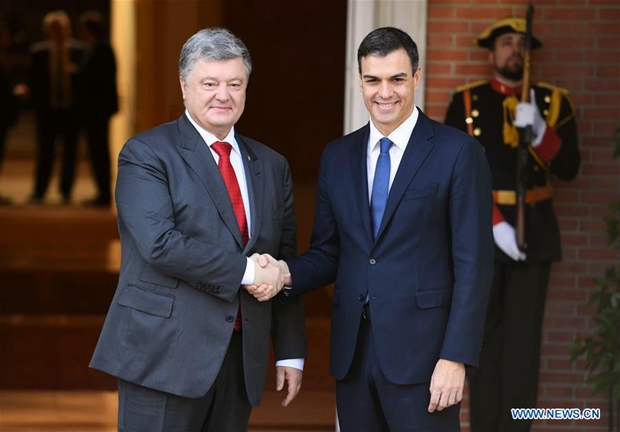Spain: The government falls
- By Heiko Khoo and Michael Roberts
 0 Comment(s)
0 Comment(s) Print
Print E-mail China.org.cn, June 12, 2018
E-mail China.org.cn, June 12, 2018

The Spanish government lost a no-confidence vote in parliament on June 1. As a result, Prime Minister Mariano Rajoy and his coalition government, led by the rightwing Popular Party (PP), fell. The vote was provoked by a corruption scandal.
A recent court case found that senior officials of the PP took illegal payments from private corporations between 1999 and 2005. The former party treasurer Luis Barcenas was sentenced to a 33-year jail term for bribery, money laundering and tax crimes, and the former PM Rajoy appears to be implicated in the case.
To oust the government, the opposition Socialist Workers' Party (PSOE), secured the votes of Podemos, a leftwing party, as well as the Catalan and Basque nationalist parties.
PSOE's leader Pedro Sanchez is the new prime minister of the world's 13th largest and the Eurozone's fourth-largest economy. Sanchez used to work as an economist and "political adviser" in the European parliament. He takes over as the PM of a minority socialist government, which will have to rely on the votes of Podemos and the nationalists. However, the government faces a host of economic challenges that the PP failed to solve.
In the 1990s Spain experienced a real GDP growth rate of 3.5 percent a year, but in the decade before the Great Recession of 2008, Spain's economic growth was derived mainly from investment in property. In the 2000s, growth ceased to be based on productive investment in industry and exports, and the economy was transformed into a housing and real estate credit bubble.
A recent EU country report on Spain said: "The pre-crisis period was characterized by decreasing productivity of capital, measured as output per units of capital stock, both in absolute terms and relative to the euro area average. This is because capital flew to non-tradable sectors, in particular construction and real estate, characterised by higher profitability but lower marginal returns. By contrast, investment in information and communication technologies or intellectual property remained below that of other euro area countries."
After the Great Recession, Spanish capital was more efficiently allocated by suppressing wages and employing cheap labor, rather than by investing in new technology to raise productivity. Today, gross fixed capital formation remains well below pre-crisis levels; and this includes all investment, private and government. Indeed, productive investment has recovered even less. Compared to pre-crisis rates, the Spanish investment to GDP rate has fallen more than its EU rivals.
The Achilles heel of Spanish capitalism is the long-term decline in its profitability. Every measure of the profitability of Spanish capital reveals the same decline. After the Great Recession the recovery of profitability has been slow. The rate of profit is 7 percent below where it was in 2007, despite huge cuts in government spending, and falling unemployment and wages.
The IMF's latest report on Spain says: "Since 2009, unemployment has declined for all age groups, but remains higher than before the crisis, disproportionately affecting low-skilled workers. Those out of jobs more than a year account for roughly half of the unemployed. Involuntary part-time employment remains high, well above the EU average. More than a quarter of workers are under temporary contracts and the share of temporary employment among the youth is above its pre-crisis level."
Spain experienced a zero real wage growth, the lowest of all EU countries in 2017. This year, real wage growth is expected to be negative, although Italian and British workers are predicted to suffer a bigger fall. "Austerity" through the guise of cuts in government spending, higher taxes and running budget surpluses (before interest costs) ceased in 2015, but the state is still burdened with debts acquired from bailing out Spain's reckless and corrupt banking system. According to the IMF, the annual gross financing needs are the highest in the euro area…even higher than debt-ridden Italy.
This long depression has also exacerbated pressure to break up the Spanish state, as last year's unresolved Catalan separatist crisis revealed. Spain's regional governments are deeply in debt but are being asked to make huge spending cuts. So, richer regional areas with their own nationalist interests, such as Catalonia and the Basque Country, have been making demands for separation or greater autonomy from Madrid. The Sanchez government will now depend on their votes. A period of profound instability has opened up in Spain.
Heiko Khoo is a columnist with China.org.cn. For more information please visit:http://china.org.cn/opinion/heikokhoo.htm
Opinion articles reflect the views of their authors, not necessarily those of China.org.cn.





